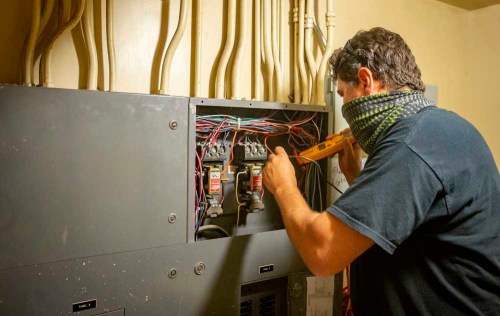Return from remote work provides energy-saving opportunities
Published 7:00 am Thursday, June 24, 2021

- Jason Hogge, a maintenance mechanic at Blue Mountain Community College, uses a multimeter to check an electrical panel on Wednesday, June 23, 2021, while working on the automated lighting system at BMCC in Pendleton.
HERMISTON — As businesses reopen, extend their hours or bring workers back to the office for the first time since the pandemic began, Energy Trust of Oregon is reminding them it is a good opportunity to examine their energy usage.
“Smaller changes that wouldn’t be noticeable to employees working in the space or customers can make a big difference,” said Susan Jowaiszas, marketing lead for Energy Trust of Oregon.
Trending
She said businesses can think about how they’re using their buildings, and pull back on heating or cooling areas that aren’t being used, for example.
That practice has been a focus for Blue Mountain Community College.
Dwayne Williams, facilities director for BMCC, said his department has asked all staff to provide a schedule of when they will be in their offices or classrooms so that they can plan heating, cooling and lighting accordingly. If no one is going to be in a certain room or section of the building, the temperature will be allowed to drop or climb, depending on the season.
“We’re doing out best to try and conserve as much energy as we can while still keeping everyone comfortable,” he said.
The HVAC systems across BMCC’s campuses can be controlled remotely from Pendleton, as can much of the lighting, which is also attached to motion sensors.
The college is part of Energy Trust of Oregon’s Strategic Energy Management program, which provides a free year-long training and cash incentives for businesses and other organizations looking to save money on energy. Williams said BMCC has saved thousands of dollars through simple management practices, and been able to funnel that money back into things like new equipment for groundskeeping staff.
Trending
In 2019 they had a contest between buildings owned by the college. The building that saw the most energy savings over the course of a month got $1,000 for staff in that building to use on something that would help them save energy, such as lap blankets. Williams said that small activity provided a good reminder for people to get in the habit of thinking about their energy consumption.
“People would walk by and turn the lights off if no one was in the room,” he said. “We did actually see some pretty good savings.”
In addition to being strategic about heating, cooling and lighting schedules, Energy Trust of Oregon recommends businesses think about the air they’re using. Jowaiszas said with the focus on airflow in preventing the spread of COVID-19, many businesses are following recommendations to pull in 100% of the air coming through the HVAC system from outdoors instead of recirculating the same air inside the building.
While that is a good practice to help protect people from airborne viruses, she said, pulling hot air in from outside takes more energy to heat, so businesses keeping their HVAC system on to some extent in their off hours could consider recirculating air during times no one is in the building.
Keeping blinds closed when hot sunlight is pouring in during the summer and opening them to let sunshine in during the winter can also help, she said. So can keeping thermostats at a more moderate level, sealing up cracks with caulk and using weatherstripping under doors.
If a business is opening up their building after a long period of employees working from home, she said, they should be especially careful to check that filters, heat pumps, vents and other parts of their HVAC systems are clean.
“It’s not uncommon to find birds’ nests, raccoon leavings, beehives, and things like that inside, which can hinder airflow,” she said.
When it comes to equipment, starting up large items on a staggered timetable instead of all at once can help prevent a surge to the system. Jowaiszas recommend people also do their research on energy ratings and available incentives when purchasing new appliances or other equipment for their business.
“When people are looking at purchasing equipment, they need to look at not just what the equipment costs upfront but also what it will cost to run over time,” she said.
The cheapest energy is the energy we as a society never have to produce, she said, so Energy Trust of Oregon is here to help people save as much power as they want to.









